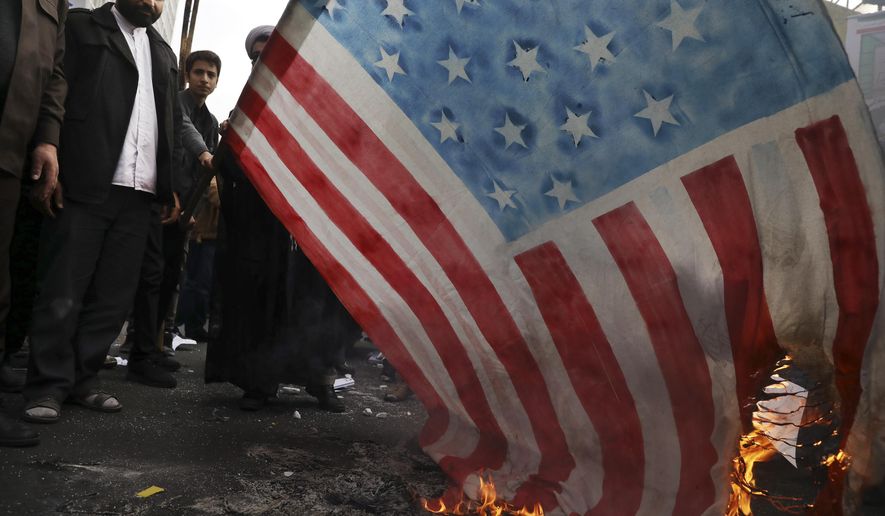U.S.-Iran tensions escalated Monday as Tehran announced a doubling of its uranium enrichment activities in a calculated breach of the 2015 nuclear deal with world powers and the Trump administration leveled a slate of fresh sanctions targeting an inner circle of officials around Iranian Supreme Leader Ayatollah Ali Khamenei.
The developments, coinciding with the 40th anniversary of the hostile 1979 takeover of the U.S. Embassy in Iran and the 444-day hostage crisis that followed, are likely to trigger further escalation as the Trump administration ramps up its “maximum pressure campaign” against Iran.
The pressure campaign has been central to President Trump’s strategy since pulling out of the Obama-era nuclear deal last year. Administration officials say the goal now is to push Iranian leaders into new negotiations addressing not only their nuclear activities but also ballistic missile programs and backing of militant proxies around the Middle East.
European nations, desperate to preserve the deal while reining in Tehran, pleaded with Iran to reverse course. Iran says it is justified in light of Mr. Trump’s campaign to reimpose harsh economic sanctions that were supposed to be lifted under the deal.
German Foreign Minister Heiko Maas called Tehran’s increased nuclear enrichment unacceptable. He said it puts “the entire nuclear agreement at risk” and urged Iran to return to compliance.
Iranian officials said they are now operating 60 advanced IR-6 enrichment centrifuges, devices essential to developing nuclear bombs. The figure is twice the number allowed under the 2015 nuclear deal.
Iranian officials have a history of claiming their nuclear activities are purely peaceful, but analysts say the advanced enrichment is not necessary for electricity generation or civilian medical research.
Analysts warned that Monday’s move may shorten the one-year time frame that Iran is believed to need to “break out” and enrich enough nuclear material for bombs.
Ali Akbar Salehi, the head of the Atomic Energy Organization of Iran, said Tehran is also separately experimenting with a centrifuge prototype designed to enrich 50 times faster than the current capability — prompting some to warn that Tehran is now bent on developing bombs quickly to counter Washington’s mounting pressure campaign.
Embassy takeover anniversary
Mr. Salehi’s claim came against a backdrop of anti-American rallies in Tehran, where demonstrators shouted “Death to America” and likened the United States to a “poisonous scorpion” at events commemorating the 40th anniversary of the embassy seizure.
An Associated Press report from Tehran said demonstrators were gathered in front of the former U.S. Embassy downtown as state television aired footage from other cities across the country. “Thanks to God, today the revolution’s seedlings have evolved into a fruitful and huge tree that its shadow has covered the entire” Middle East, said Gen. Abdolrahim Mousavi, the commander of the Iranian army.
But the demonstrations were held as Iran’s regional allies in Iraq and Lebanon were facing political crises. Three protesters were killed Sunday night when a mob attacked the Iranian Consulate in Karbala, Iraq, a holy city for Shiites. Mr. Trump retweeted posts by Saudi-linked media Monday morning showing the chaos outside the consulate.
A senior administration official told reporters on background that “even [Iran’s] proxies are starting to see Iranian patronage as the dead end that it is.”
Secretary of State Mike Pompeo, meanwhile, said the 1979 embassy takeover showed how the Iranian regime’s “first acts after gaining power were a clear indication of its evil character.” He added that “the regime continues to unjustly detain Americans and to support terrorist proxy groups.”
He made the comments after the administration announced new sanctions targeting 10 officials from the Iranian supreme leader’s inner advisory circle, the latest in a slew of U.S. sanctions targeting virtually the entire Iranian military and political establishment.
“This action further constricts the Supreme Leader’s ability to execute his agenda of terror and oppression,” Treasury Secretary Steven T. Mnuchin said in a statement.
The latest sanctions were imposed roughly seven months after Mr. Trump made global headlines by designating Iran’s Islamic Revolutionary Guard Corps — an elite unit of the Iranian military — as a terrorist organization. The Trump administration has also imposed sanctions on Iranian Foreign Minister Javad Zarif, a key architect of the 2015 nuclear accord.
Iran has complained bitterly about the sanctions, but Mr. Trump has appeared unfazed. He recently authorized the deployment of some 3,000 U.S. military personnel to Saudi Arabia, a major regional rival of Iran.
U.S. officials say the forces, as well as a slate of missile defense equipment, will protect against the threat of attacks on oil infrastructure in Saudi Arabia. U.S., Saudi and European officials have all said Iran is responsible for the Sept. 14 missile strikes that damaged key Saudi energy infrastructure.
⦁ Dave Boyer contributed to this article, which is based in part on wire service reports.
• Guy Taylor can be reached at gtaylor@washingtontimes.com.




Please read our comment policy before commenting.